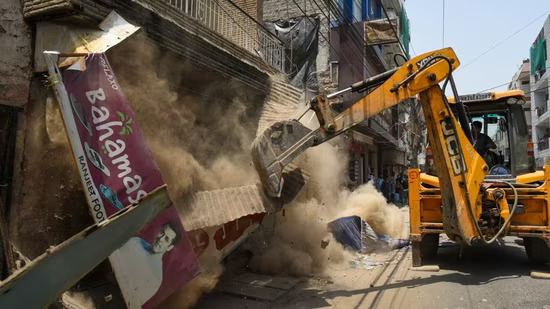On Wednesday, the Supreme Court ruled that citizens’ voices cannot be “throttled by a threat of destroying their properties” and that such “bulldozer justice” has no place in a society where the rule of law is upheld. This decision established the first-ever standards against state authorities’ arbitrary demolitions.

In a detailed order posted on Saturday, the eve of Justice Chandrachud’s retirement, a bench led by Chief Justice of India (CJI) Dhananjaya Y. Chandrachud stated, “Justice through bulldozers is unknown to any civilized system of jurisprudence. There is a grave danger that if high-handed and unlawful behavior is permitted by any wing or officer of the state, demolition of citizens’ properties will take place as a selective reprisal for extraneous reasons”.
The court established necessary protections for all states and Union territories, stating that proper surveys, written notices, and consideration of objections must be conducted prior to any destruction. The bench, which also included justices JB Pardiwala and Manoj Misra, ruled that officials who disobey these rules would incur criminal charges in addition to disciplinary action. “It is unacceptable for the State Government to act in such a domineering and unilateral manner. The constitutional recognition of the right to property under Article 300A would be rendered meaningless if it were allowed”.
Even for development projects, the court ordered six necessary measures to be taken before any property may be demolished. Authorities must:
(1) confirm current land records and maps
(2) conduct appropriate surveys to find actual encroachments
(3) notice alleged encroachers in writing
(4) consider objections and issue speaking orders
(5) provide a reasonable amount of time for voluntary removal
(6) legally acquire additional land if necessary
Rules for bulldozer destruction
A case concerning the demolition of journalist Manoj Tibrewal Akash’s ancestral home in the Maharajganj region of Uttar Pradesh in September 2019 gave rise to the recommendations. Investigations showed a sequence of infractions that the court said demonstrated the abuse of state power, notwithstanding authorities’ claims that the demolition was required to widen a National Highway. Although only 3.70 meters of the property allegedly encroached on government land, the National Human Rights Commission (NHRC) discovered that officials demolished between 5-8 meters without providing written notice. Only a drum-beating public notice before the demolition. Tibrewal claimed that his father’s desire for a SIT investigation into purported anomalies in the ₹185 crore road construction project was the reason behind the demolition. The court emphasized the risks of employing demolitions as selective punishment, even though it didn’t specifically address this claim.
“A person’s homestead is their greatest source of security. Unlawful intrusion and possession of public property are not permitted by the law. When such laws are in place, the protections they offer must be followed, the court stated.
In addition to ordering the UP chief secretary to start disciplinary actions and file a criminal case against the guilty officials and contractors who demolished the house without providing a notice or any documentation to support the road’s expansion, the court ordered the state to give the petitioner ₹25 lakh in interim compensation. “Public accountability for public officials must be the norm. Officials of the state who carry out or sanction such unlawful action must be proceeded against for disciplinary action and their infractions of law must invite criminal sanctions,” the court stated.
In accordance with the NHRC’s directive, the chief secretary must also investigate comparable demolitions that were done in the region without sufficient notice and make sure the CB-CID investigates the FIR. The chief secretary must put the order into effect within a month, and the disciplinary hearings must be finished within four months of the start date.
A bench led by Justice Bhushan R. Gavai recently reserved orders on several petitions contesting arbitrary demolitions in several states, therefore the ruling comes at a critical moment. Authorities have been accused of employing bulldozers against the properties of demonstrators, minorities, and government critics without following due process in several cases in recent years, especially in places where the BJP is in power.
The chief secretaries of every state and Union territory are to receive copies of these recommendations for prompt implementation, the court said. While emphasizing that removal must adhere to established legal procedures and protections, the court clarified that the law does not tolerate illegal encroachments.
Read Also: Athiya Shetty, KL Rahul Announce Pregnancy: “Our Beautiful Blessing Is Coming Soon. 2025”